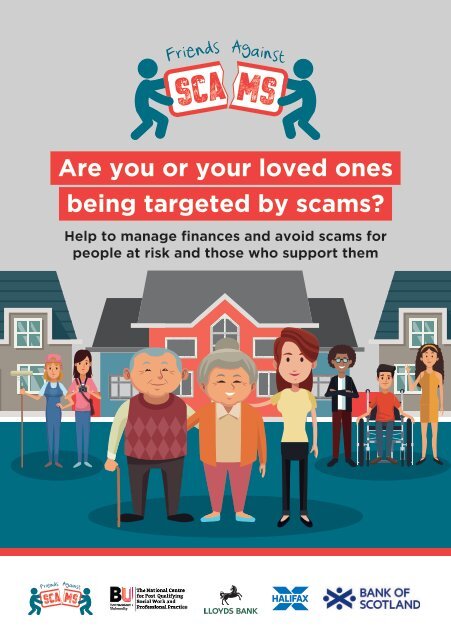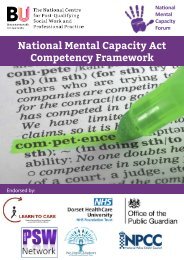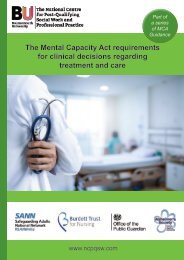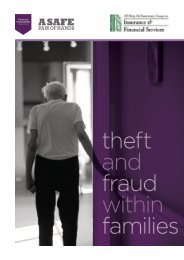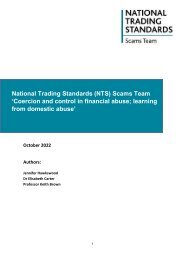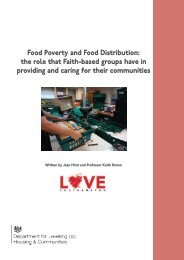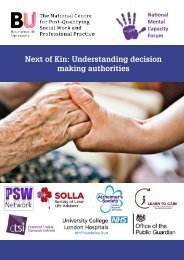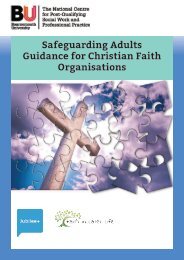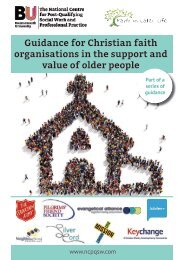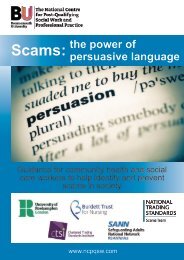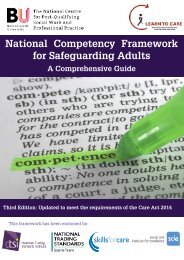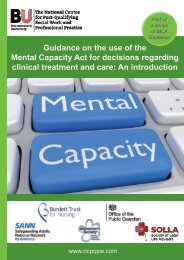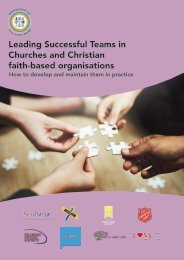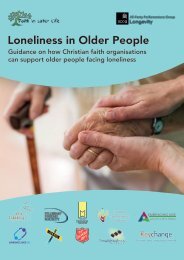Create successful ePaper yourself
Turn your PDF publications into a flip-book with our unique Google optimized e-Paper software.
Are you or your loved ones<br />
being targeted by scams?<br />
Help to manage finances and avoid scams for<br />
people at risk and those who support them
2
Contents<br />
3 About this guide<br />
4 Introduction<br />
5 What to do if you think you have responded to a scam<br />
6<br />
PART ONE: Stopping criminals from reaching you<br />
Mail Scams<br />
7 Scam calls<br />
8 Doorstep scams<br />
9 Internet scams<br />
10 Other practical advice<br />
11<br />
PART TWO: Help a friend or relative with their finances<br />
12 What is a Lasting Power of Attorney (LPA)?<br />
13 Types of Lasting Power of Attorney<br />
Things to consider when appointing an attorney<br />
14 Registering as an attorney with the bank<br />
More help and advice on LPAs and managing your finances<br />
15 Useful signs<br />
About this guide<br />
This guide has been brought to you by the National Trading<br />
Standards Scams Team and the National Centre for Post Qualifying<br />
Social Work and Professional Practice at Bournemouth University,<br />
working in partnership with <strong>Lloyds</strong> Bank, Halifax and Bank of<br />
Scotland. Our teams have been leading research on scams and<br />
fraud across the UK. We work closely with people who have fallen<br />
victim to scams and we use their insights to help protect others.<br />
The advice in this guide is based on our knowledge and practical<br />
experience of what works.<br />
3
Introduction<br />
If you are worried about becoming a victim, or have responded to<br />
scams in the past, this guide sets out some practical things you can<br />
do to prevent criminals contacting you. It also gives information on<br />
how you can nominate a trusted friend or relative to help manage<br />
your finances if you need help to make decisions.<br />
If you are concerned about a friend or relative, you can also use the<br />
tips in this guide to help protect them from scams.<br />
Remember that the criminals who set out to trick you into sending<br />
them money are extremely clever and sophisticated. They may spend<br />
hours researching you or weeks building up a relationship of trust.<br />
They will use pressure tactics to make you give them what they want.<br />
Anyone can fall victim to a scam, but some people are more<br />
susceptible than others because of their circumstances. People living<br />
with some form of cognitive impairment, such as dementia, may be<br />
unable to distinguish scams from legitimate opportunities.<br />
The National Trading Standards Scams Team created the Friends<br />
Against Scams initiative to protect and prevent people from falling<br />
victim to this type of crime.<br />
For further information on how to spot a scam, complete the<br />
awareness session to become a Friend Against Scams. Go online to<br />
www.friendsagainstscams.org.uk or look out for scams awareness<br />
events in your area.<br />
4
What to do if you think you<br />
have responded to a scam<br />
If you do respond to a scam, whether by post,<br />
telephone, internet, email or on the doorstep,<br />
it’s important that you report it quickly so<br />
that you get the right support. Don’t be<br />
embarrassed to talk to friends and family to<br />
get their help – remember that you have been<br />
the victim of a sophisticated crime.<br />
Remember -<br />
scams are a<br />
crime. Don’t be<br />
embarrassed to ask<br />
for support from<br />
those around you.<br />
If you have made a payment in response to a scam, contact your<br />
bank as soon as possible as they may be able to recover some of<br />
your money and will refund you in certain circumstances.<br />
If you or someone else is in immediate danger because of a scam<br />
(for example, if they are being threatened by an aggressive<br />
doorstep caller), call the police on 999.<br />
England & Wales<br />
REPORT: contact Action Fraud on 0300 123 2040.<br />
ADVICE: contact Citizens Advice on 0808 223 1133.<br />
Scotland<br />
REPORT: call Police Scotland on 101.<br />
ADVICE: contact Advice Direct Scotland on 0808 164 6000.<br />
Northern Ireland<br />
REPORT: contact Action Fraud on 0300 123 2040 or call the<br />
police on 101.<br />
ADVICE: contact Consumerline on 0300 123 6262.<br />
You can find more general information and advice<br />
on scams on the Take Five website:<br />
www.takefive-stopfraud.org.uk<br />
5
PART ONE:<br />
STOPPING CRIMINALS<br />
FROM REACHING YOU<br />
Mail scams<br />
If you receive scam mail, you may want to consider reducing the<br />
amount that reaches you. Ask a friend or relative to go through your<br />
post with you and help identify any scams. Remember that scam mail<br />
can come in many forms, including lotteries, prize draws, catalogues,<br />
and clairvoyant scams. You can reduce the amount of junk and scam<br />
mail you receive by following these tips:<br />
Become a Scam Marshal and send any scam mail you receive<br />
to the National Trading Standards Scams Team to help them<br />
investigate and stop the criminals behind scams. You will receive<br />
information to help you identify scams. Sign up online at<br />
www.friendsagainstscams.org.uk or write to<br />
‘FREEPOST NTSST MAIL MARSHAL’.<br />
Sign up to Royal Mail’s paid-for redirection service to have your<br />
post delivered to a trusted friend or relative. Apply online at<br />
www.royalmail.com or at a Post Office branch.<br />
Sign up to the Mailing Preference Service (MPS). Although the<br />
MPS does not stop scam mail, it will reduce the amount of direct<br />
marketing mail that you receive. The MPS is a free service. For<br />
more information and to register visit www.mpsonline.org.uk or<br />
call 0207 291 3310.<br />
6
Scam calls<br />
Scam calls are a common method criminals use to try to gain<br />
people’s personal and financial information. The calls can be very<br />
intimidating and the criminals can apply a lot of pressure, but it’s<br />
important to remember that if you’re not comfortable with the call,<br />
it’s okay to hang up. Cut out the sign at the back of this leaflet and<br />
place it near your phone to remind you. There are several options you<br />
can look at to help stop the criminals getting in contact with you:<br />
Look into purchasing a call blocking unit. These are units that<br />
connect to your landline and block scam and nuisance calls.<br />
Different brands will work in different ways and vary in how<br />
restrictive they are on incoming calls, so it’s best to look at the<br />
options available and pick one that suits you.<br />
Many landline providers now offer options for preventing nuisance<br />
calls which are free to their customers. For more information on<br />
these, contact your landline provider or visit their website.<br />
Sign up to the Telephone Preference Service (TPS) – Although<br />
the TPS does not stop scam calls, it will reduce the amount of<br />
unwanted sales and marketing calls received. The TPS is a free<br />
service. For more information and to register, visit<br />
www.tpsonline.org.uk or call 0345 070 0707.<br />
7
Doorstep scams<br />
To stay safe from doorstep scams, never trade with people on<br />
your doorstep. Remember, if you’re not sure, don’t open the door.<br />
Legitimate tradespeople will never pressure you to enter a contract<br />
straight away. Here are a few other ways that you can protect<br />
yourself from doorstep scams:<br />
Display a ‘No Cold Calling’ sticker on your front door. Cut out the<br />
sign at the back of this leaflet or download a printable version here:<br />
www.friendsagainstscams.org.uk/NCC. You may be able to<br />
obtain a free ‘No Cold Calling’ sticker from your local council or<br />
local police.<br />
Use a good trader scheme to find legitimate traders. Contact your<br />
local council to find a scheme in your area.<br />
Install a door chain and/or a spy hole on your front door to check<br />
who is there.<br />
If you are expecting a trader, ask to see identification from them.<br />
Then phone the company they are from to check they are genuine<br />
before letting them into your home. Make sure you call using a<br />
number you know to be genuine; do not use a number they<br />
give to you.<br />
8
Internet scams<br />
With the rising threat of online scams, it’s important to remember<br />
to be careful when using the internet. Criminals can create flashy,<br />
official looking websites and emails all in an aim to extract personal<br />
or financial information. Be wary of links and attachments in emails<br />
and keep your guard up – especially if you receive an email you are<br />
not expecting. Here are a few top tips:<br />
Keep your computer up to date – you will be better protected if<br />
you keep the operating system (such as Windows or Mac) updated.<br />
You should receive notifications when you need to update the<br />
system.<br />
Use the latest version of your internet browser (such as Edge,<br />
Chrome and Firefox) – this will help to provide better protection<br />
from scams, viruses and other possible threats.<br />
Use security software (for example anti-virus, anti-spyware and<br />
firewall) to protect your computer from viruses and attempts to<br />
steal your personal information. Some computers already have<br />
security software installed, or you can check<br />
www.getsafeonline.org for advice on reputable providers.<br />
9
Use a different, strong password for every online account in case<br />
one gets hacked. You can use a password manager to help you<br />
store your passwords securely – this means you’ll only have to<br />
remember one strong master password.<br />
Enable multifactor (or two-factor) authentication on online<br />
accounts like your email. This is a safer way to log in and requires<br />
another source such as a mobile phone to authenticate that it is<br />
you logging on to your account.<br />
You can find more information about using the internet<br />
safely on www.getsafeonline.org or search for<br />
‘How to stay safe online’ at www.ageuk.org.uk for tips<br />
on avoiding online scams.<br />
Other practical advice<br />
It is good practice to ensure that you do not hold too much cash in<br />
your current accounts. Keep the bulk of your money in savings or<br />
deposit accounts. This means that if a criminal gains access to your<br />
current account or convinces you to make a payment, they will only<br />
be able to access a limited amount of your money.<br />
If you are struggling to manage your financial affairs or you feel<br />
particularly concerned about scams, consider contacting your bank.<br />
Explain how and why you feel concerned about scams and ask them<br />
for help in providing additional security measures to better protect<br />
your account. The bank will then be able to offer a range of measures<br />
to support you and protect you from scams.<br />
If you notify the bank, the bank has a duty of care to ensure you<br />
are protected.<br />
10
PART TWO:<br />
HELP A FRIEND OR RELATIVE<br />
WITH THEIR FINANCES<br />
Although we are all potential victims of financial crime and scams,<br />
there is clear evidence that criminals target lonely, older citizens,<br />
particularly those with cognitive impairment, seeing these people as<br />
‘easy’ targets.<br />
<strong>Cognitive</strong> impairment is when a person has trouble remembering,<br />
learning new things, concentrating, or making decisions that affect<br />
their everyday life. It can be caused by a number of conditions,<br />
including dementia or brain injury. <strong>Cognitive</strong> decline is when the<br />
person’s cognitive ability is not going to improve but will get worse<br />
over time; it is usually not reversible.<br />
If you have a relative or friend you care for who is experiencing<br />
cognitive decline, helping them to manage their finances, and<br />
particularly ensuring they do not become a victim of financial crime,<br />
is usually a major concern.<br />
Remember - signing<br />
cheques on behalf of<br />
somebody else or sharing<br />
your PIN and internet<br />
banking passwords are,<br />
in effect, illegal. You<br />
can only legally act on<br />
behalf of somebody<br />
who lacks capacity to<br />
make their own decisions<br />
via a Lasting Power of<br />
Attorney (LPA) or if<br />
you are a court<br />
appointed deputy.<br />
11
What is a Lasting Power of<br />
Attorney (LPA)?<br />
Many people assume that because they are ‘the next of kin’ or a<br />
close friend that they can act on behalf of somebody with cognitive<br />
decline, especially when they lose the ability to make decisions for<br />
themselves. The technical term for this ability to make decisions is<br />
mental capacity. Unfortunately, this is not the case in law.<br />
To legally act on behalf of a friend or relative, a valid Lasting Power of<br />
Attorney is needed (called Powers of Attorney in Scotland).<br />
A Lasting Power of Attorney (LPA) is a legal document which allows<br />
you to appoint a friend or relative to help you make decisions or to<br />
make decisions on your behalf.<br />
How and when to apply for Lasting Powers of Attorney<br />
Everyone over the age of 18 should consider putting LPA<br />
arrangements in place. Brain injury following an accident, a stroke, or<br />
dementia can affect us at any stage of life. Ensuring you have an LPA<br />
in place is even more important if you are diagnosed with a condition<br />
that causes cognitive decline.<br />
If you do not have a valid and registered LPA and you lose capacity,<br />
your relatives will need to go to the Court of Protection and seek<br />
a court appointed deputy to act on your behalf. This can be a<br />
lengthy and costly process, so it is important to plan ahead and apply<br />
for an LPA.<br />
To appoint a relative or friend as an attorney, read the<br />
guidance at www.gov.uk/power-of-attorney. You can<br />
complete the application online yourself, but you may<br />
wish to seek advice from a solicitor.<br />
12
Types of Lasting Power<br />
of Attorney<br />
There are two types of LPA. One is called a Health and Welfare<br />
LPA (called Welfare Power of Attorney in Scotland) and allows<br />
the nominated person (‘the attorney’) to speak and act on your<br />
behalf regarding your health and welfare, such as giving consent for<br />
treatment and end of life care. Health and Welfare LPAs can only<br />
come into force when you have lost capacity and you cannot give<br />
informed consent.<br />
The Property and Finance LPA (called Continuing Power of<br />
Attorney in Scotland) allows the attorney to manage your financial<br />
affairs. You can specify whether:<br />
a) You want the attorney to act on your behalf immediately, even<br />
while you have capacity (you might prefer a relative to manage<br />
your finances).<br />
b) You only want the attorney to act on your behalf when you<br />
lose the mental capacity to act for yourself (for example due to<br />
dementia or cognitive decline).<br />
Things to consider when<br />
appointing an attorney<br />
Lasting Powers of Attorney are very important in ensuring our wishes<br />
and desires are upheld and acted upon when we are no longer able<br />
to act for ourselves.<br />
Because they are so powerful, you must think carefully about whom<br />
you ask to be your attorney.<br />
Do you trust them? Are you sure they will act on your behalf in the<br />
manner you would expect and in your best interests?<br />
Remember you can appoint more than one person to act as<br />
your attorney. You can choose whether you want them to make<br />
decisions together or be able to act on your behalf individually.<br />
13
Registering as an attorney<br />
with the bank<br />
If you are an attorney for a person (in other words, an LPA has been<br />
drawn up asking you to act on behalf of the person – known as the<br />
donor), then you should make a branch appointment at their bank<br />
to register the LPA. Take the original or a certified copy of the LPA<br />
and proof of your ID with you to the bank. You may also be able to<br />
register over the phone.<br />
A Property and Financial Affairs LPA will give you the legal authority<br />
to manage the accounts of the donor. The bank will set up processes<br />
and systems for you to manage and operate the accounts on behalf<br />
of the donor.<br />
The bank will always help you with this process.<br />
More help and advice on LPAs<br />
and managing your finances<br />
Bournemouth University’s National Centre for Post-Qualifying Social<br />
Work and Professional Practice has published guides on LPAs and<br />
on financial scamming: www.ncpqsw.com<br />
Visit your local Citizens Advice Bureau for help and advice on<br />
managing affairs for someone else, or read the guidance on their<br />
website: www.citizensadvice.org.uk<br />
Call Age UK’s advice line on 0800 678 1602; or visit your local Age<br />
UK branch. You can also find more information on their website:<br />
www.ageuk.org.uk.<br />
The Alzheimer’s Society gives advice and information on living with<br />
dementia, including how to manage your money:<br />
www.alzheimers.org.uk<br />
Dementia UK also has advice on living with dementia, including legal<br />
and financial aspects such as LPAs: www.dementiauk.org<br />
14
15
16
Stick this outside your front door<br />
Not sure?<br />
Don't open the door<br />
Never deal with<br />
cold calling<br />
doorstep traders<br />
Report all incidents of cold calling<br />
In an emergency, call the Police on 999<br />
Stick this inside your front door<br />
17
18
19
National Trading Standards Scams Team<br />
Website: www.nationaltradingstandards.uk<br />
Friends Against Scams<br />
St Mary’s House, St Leonard’s Road, Eastbourne,<br />
East Sussex, BN21 3UU.<br />
Website: www.FriendsAgainstScams.org.uk<br />
Email: FriendsAgainstScams@surreycc.gov.uk<br />
National Centre for Post Qualifying Social Work and<br />
Professional Practice<br />
Bournemouth University, 4th Floor, Royal London House,<br />
Christchurch Road, Bournemouth, BH1 3LT<br />
Website: www.ncpqsw.com<br />
Email: pqsw@bournemouth.ac.uk


